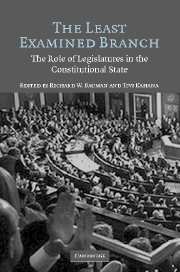Book contents
- Frontmatter
- Contents
- Foreword: Legislatures in the Constitutional State by Amy Gutmann
- Contributors
- New Ways of Looking at Old Institutions
- PART ONE LEGISLATURES AND DEMOCRATIC THEORY
- PART TWO LEGISLATING AND DELIBERATING IN THE DEMOCRATIC LEGISLATURE
- PART THREE CONSTITUTION MAKING BY LEGISLATURES: THE EXPLICIT VERSION
- PART FOUR CONSTITUTION MAKING BY LEGISLATURES: THE IMPLICIT VERSION
- PART FIVE CONSTITUTIONAL INTERPRETATION AND APPLICATION BY THE LEGISLATURE
- 16 Interpretation in Legislatures and Courts: Incentives and Institutional Design
- 17 Constitutional Engagement “Outside the Courts” (and “Inside the Legislature”): Reflections on Professional Expertise and the Ability to Engage in Constitutional Interpretation
- 18 Legislatures as Constitutional Interpretation: Another Dialogue
- 19 The Constitution and Congressional Committees: 1971–2000
- PART SIX IS LEGISLATIVE CONSTITUTIONALISM POSSIBLE?
- PART SEVEN THE LEGISLATURE IN DIALOGUE: DOMESTIC AND INTERNATIONAL CONTEXTS
- Index
16 - Interpretation in Legislatures and Courts: Incentives and Institutional Design
Published online by Cambridge University Press: 06 August 2009
- Frontmatter
- Contents
- Foreword: Legislatures in the Constitutional State by Amy Gutmann
- Contributors
- New Ways of Looking at Old Institutions
- PART ONE LEGISLATURES AND DEMOCRATIC THEORY
- PART TWO LEGISLATING AND DELIBERATING IN THE DEMOCRATIC LEGISLATURE
- PART THREE CONSTITUTION MAKING BY LEGISLATURES: THE EXPLICIT VERSION
- PART FOUR CONSTITUTION MAKING BY LEGISLATURES: THE IMPLICIT VERSION
- PART FIVE CONSTITUTIONAL INTERPRETATION AND APPLICATION BY THE LEGISLATURE
- 16 Interpretation in Legislatures and Courts: Incentives and Institutional Design
- 17 Constitutional Engagement “Outside the Courts” (and “Inside the Legislature”): Reflections on Professional Expertise and the Ability to Engage in Constitutional Interpretation
- 18 Legislatures as Constitutional Interpretation: Another Dialogue
- 19 The Constitution and Congressional Committees: 1971–2000
- PART SIX IS LEGISLATIVE CONSTITUTIONALISM POSSIBLE?
- PART SEVEN THE LEGISLATURE IN DIALOGUE: DOMESTIC AND INTERNATIONAL CONTEXTS
- Index
Summary
Why should one be interested in the question of whether nonjudicial actors have incentives to interpret constitutions reasonably well? Primarily, because some answers to that question would alleviate some well-known tensions between constitutionalism and democratic self-governance. Constitutions deprive contemporary majorities of the power to do what they want to do and are, in that sense, antidemocratic. Enforcement of constitutional restricts on self-governance by judges removed from direct democratic accountability poses the equally well-known countermajoritarian difficulty. The tension between constitutionalism and self-governance and the countermajoritarian difficulty would be substantially reduced if nonjudicial actors had incentives to interpret the constitution, and were at least as good as judges at doing so. We could get the benefits of constitutionalism and self-governance were the constitution's primary interpreters nonjudicial actors who did a reasonably good job of interpretation.
This chapter examines two questions that arise in considering the role of nonjudicial actors in constitutional interpretation, in nations with constitutional systems fairly characterized as having been democratic for some reasonable period. First, what is the standard against which that role should be measured? Analyses typically examine how legislatures go about interpreting constitutions or measure how well they interpret, with reference to how courts interpret constitutions. I argue that a court-based standard is inappropriate, and offer a constitution-based standard instead. Second, what incentives do nonjudicial actors and judges have to engage in constitutional interpretation with reference to the constitution-based standard?
- Type
- Chapter
- Information
- The Least Examined BranchThe Role of Legislatures in the Constitutional State, pp. 355 - 377Publisher: Cambridge University PressPrint publication year: 2006
- 1
- Cited by



